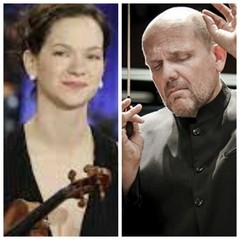|
Back
Out of the forests New York
Isaac Stern Auditorium, Carnegie Hall
06/10/2022 -
Sarah Kirkland Snider: Forward Into Light (World Premiere)
Samuel Barber: Violin Concerto, Opus 14
Gustav Mahler: Symphony No. 1
Hilary Hahn (Violin)
New York Philharmonic Orchestra, Jaap van Zweden (Music Director and Conductor)

S. K. Snider
“Forward, out of error/Leave behind the night;,/Forward through the darkness/Forward into light!”
Cicely Hamilton fromMarch of the Women, 1910
I once asked a very distinguished conductor why Mahler enjoyed such a temperamental, intellectual and sonic connection with his country, Holland. His answer was totally unexpected.
“Well, you see, we Dutch people are the most boring people in Europe. So when we find emotional thrills such as those of Mahler, of course we make the most of it.”
New York Philharmonic Conductor Jaap van Zweden is part of that rarefied pantheon, and his Mahler First Symphony at its best last night came close to the top. Before that mighty work, though, Mr. van Zweden conducted two works which–while written 80 years apart–had much in common.
This is a major week for composer Sarah Kirkland Snider. On June 14, 15, and 16, her Mass for the Endangered will be presented at the Death of Classical “Greenwood Cemetery” in its entirety. Last night, as part of the New York Philharmonic commissions for 19 women composers, Forward Into Light was given its world premiere.
Perhaps the only major flaw of the 15‑minute work was editorial, not musical. Ms. Snider went into detail not only about her title, but how the music was based on the 19th Century suffragette movement in the United Kingdom–and even had a recorded choral excerpt from Ethel Smythe’s Women’s March.
In a way, this detracted from the sheer musical attractiveness which, from the start, was entrancing. The motives were rarely played alone. Instead they rose up out of each other, each ascending theme and each undulating under-theme pressing each other forward, sometimes forming new constructions, but always going back to the original phrases.
Not once did Ms. Snider’s music lag or show academic development per se. Rather the instruments goaded each other onward, forward to a series of crescendos into a emotional climax.
True, if pictures were the goal, one conceive as waves engendering waves, or creation begetting creations or even a Darwinesque image of evolution.
But Ms. Snider proclaimed it an anthem towards women, and that shall happily suffice.
The following Samuel Barber Violin Concerto was the work of an unredeemed Romantic, yet so lyrical is this work–the orchestral textures much like Ms. Snider’s piece–that one need not pigeonhole the piece for any era or any ear.

H. Hahn/J. van Zweden
Ms. Hahn, is reputed as one of the most stunning and innovative fiddlers in the world. But she is also as much a tone‑painter as a technician. The Barber, save for the hell‑for‑leather finale, is pure painting. I had heard Hahn play this with pure romantic (never shmaltzy) feeling. Here, she was more classical. Not cold by any means–and that second movement would make even a Republican weep. But with a distance, as if Samuel Barber needed no extraneous glow for its radiance.
Onto the Mahler. But first, onto the New York Philharmonic. I hadn’t heard them for several years. And what a gift to listen again to its so sumptuous sounds, to hear climaxes performed fear, to hear those breathless woodwinds played with breath and natural feeling.
Mr. van Zweden came close to Mahler’s nature awakening, but few are the conductors who can bring the nuance, the whispers, the offstage trumpet-calls, the silence of the wind into poetry. On the other hand, I can remember no performance of the second movement with such joy, such dancing, such fierce rejoicing. It made one uncomfortably think, “Why the hell did Mahler ever go into profundities? Mysticism? Songs for dead children? Why didn’t he–like Astaire and Kelly–keep on dancing?
That satire funeral had, under Mr. van Zweden, deadpan satire, never hurting, always fun. Yet from the first chaotic chord of the finale, the Zweden/Mahler alliance burst open. True, this is inevitably a crowd‑pleaser, but the conductor transformed this, the earliest Mahler symphony–into an Austrian/Jewish version of an unalloyed Antonín Dvorák furiant.
Harry Rolnick
|